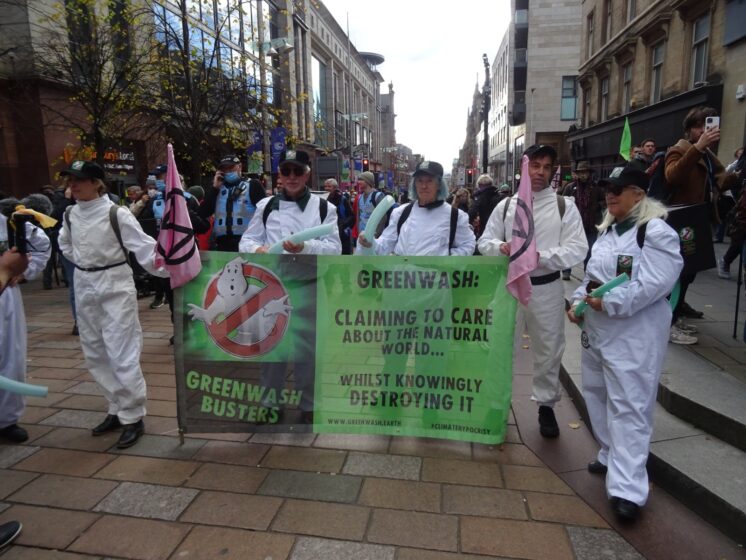Australian civil society groups are mainstreaming corporate accountability into law by using existing prohibitions against misleading and deceptive conduct to challenge greenwashing. Australian companies may now face such claims, as well as financial and reputational damage, if they greenwash.
 Photo: By Stay Grounded - Bristol Airport Greenwashbusters, CC BY 2.0, https://commons.wikimedia.org/w/index.php?curid=112407410
Photo: By Stay Grounded - Bristol Airport Greenwashbusters, CC BY 2.0, https://commons.wikimedia.org/w/index.php?curid=112407410Greenwashing means “falsely conveying to consumers that a given product, service, company or institution meaningfully factors environmental responsibility into its offerings and/or operations”.[1]
Greenwashing is an example of two harmful corporate strategies identified by Mind the Gap: disseminating distorted information and engaging in fraudulent activities. Greenwashing often involves companies spreading distorted information about their measures to address climate or environmental risks to make them more attractive to the public, minimise perceptions of irresponsibility, or deflect public scrutiny about their contribution to climate change. Greenwashing commonly involves the use of environmentally friendly rhetoric, language, or images in corporate slogans or policies without meaningful reduction of environmental impact.[2]
Australian law, including the Australian Consumer Law – which applies to all Australian businesses –, prohibits false, misleading, and deceptive conduct in “trade or commerce”.[3] Businesses that falsely represent their goods or services or mislead or deceive consumers are liable for civil (financial) penalties, including for any economic loss or damage suffered.
Oil and gas producer Santos’ practices challenged in misleading and deceptive conduct claim
In August 2021, the Australasian Centre for Corporate Responsibility (ACCR) filed a misleading and deceptive conduct claim against Santos Limited, Australia’s second largest oil and gas producer. In its 2020 annual report, Santos claimed that natural gas produces “clean fuel” and provides “clean energy” and that the company has a “credible and clear plan” to achieve “net zero” emissions by 2040. According to the ACCR, Santos failed to disclose that the processing, extraction, and end-use of natural gas releases significant amounts of carbon dioxide and methane into the atmosphere, and that Santos does not produce (nor intend to produce) energy using renewable energy sources. Santos’ statements are also allegedly misleading because the company intends to increase its greenhouse gas emissions by expanding its natural gas operations, and Santos has not decided whether to proceed with its net zero plans, and those plans rely on undisclosed qualifications and assumptions about highly contentious carbon capture and storage (CCS) and blue hydrogen processes.[4] The claim against Santos is a unique example of civil society groups seeking to mainstream corporate accountability into law – the case is the first in the world to challenge a company’s net zero emissions target, and to consider the viability of CCS processes and the environmental impacts of blue hydrogen.
Commonwealth Bank of Australia’s climate commitments challenged
Another claim is examining possible corporate greenwashing by Australia’s largest bank. In August 2021, Guy and Kim Abrahams (‘the plaintiffs’), represented by Australian law firm Equity Generation Lawyers, filed a claim against Commonwealth Bank of Australia (CBA). The claim focuses on CBA’s 2019 Environmental and Social Framework, which includes a commitment to only provide financial support to new oil, gas, and coal projects “supported by an assessment of the environmental, social and economic impacts of such activity, and if in line with the goals of the Paris Agreement” to ensure CBA supports “responsible transition to a net zero emissions economy by 2050.” The plaintiffs – both long-term shareholders in CBA – are concerned about the veracity of CBA’s commitment in view of its decision to finance seven new fossil fuel projects. They are seeking access to relevant CBA documents, including documents assessing the impacts of these projects and their alignment with the Paris Agreement, as well as CBA’s implementation of its climate change commitments. In November 2021, the court ordered (by consent of both parties) that CBA provide certain documents to the plaintiffs. Documents have been provided by CBA and the plaintiffs are seeking the production of further documents. The proceedings are ongoing and are an example of seeking disclosure of company documents to embed company’s responsibilities into practice and law.
“Greenwashing is dangerous because it delays meaningful action on greenhouse gas emissions and fools the increasingly climate-conscious public into thinking that harmful products are actually good for the environment.
We say Ampol’s claims that petrol or diesel fuels can be carbon-neutral could mislead consumers into thinking that their driving does not contribute to Australia’s emissions and as a result, emissions could increase.”
– Kirsty Ruddock, Managing Lawyer of the Environmental Defenders Office.
Increased awareness about greenwashing by Australian companies
Civil society groups’ efforts have borne fruit, and companies’ awareness about the potential legal (and reputational) consequences of greenwashing is increasing. In June 2022, the Australian Securities and Investment Commission (ASIC) published a factsheet on How to avoid greenwashing when offering or promoting sustainability-related products. The factsheet noted increased investor demand for and thus availability of sustainability-related financial products (meaning financial products incorporating environment, social, and governance (ESG)-related considerations), increasing the risk of greenwashing and confusing and misleading investors. The factsheet calls out corporate claims of net zero carbon emissions and the danger that these claims may be misleading if there are no reasonable grounds for the representation.
Advocacy by Australian civil society has contributed to increased awareness about the harms of greenwashing. Australian companies are now on notice that greenwashing may lead to misleading and deceptive conduct claims, and they may face legal, financial, and reputational damage if they greenwash.
[1] Greenpeace Australia, Hero to Zero: Hero to zero: Uncovering the truth of corporate Australia’s climate action claims, September 2021, page 18, https://www.greenpeace.org.au/wp/wp-content/uploads/2021/09/Hero_to_Zero2021_FF_Digital.pdf (accessed 22 August 2022).
[2] Greenpeace Australia, Hero to Zero: Hero to zero: Uncovering the truth of corporate Australia’s climate action claims, September 2021, page 18, https://www.greenpeace.org.au/wp/wp-content/uploads/2021/09/Hero_to_Zero2021_FF_Digital.pdf (accessed 22 August 22, 2022).
[3] Australian Consumer Law, Schedule 2 of the Competition and Consumer Act 2010 (Cth), section 18, http://www5.austlii.edu.au/au/legis/cth/consol_act/caca2010265/sch2.html (accessed 22 August 2022). Prohibitions against misleading and deceptive conduct are also found in other Federal laws: Corporations Act 2001 (Cth), sections 1041E, 1041G and 1041H, http://classic.austlii.edu.au/au/legis/cth/consol_act/ca2001172/s1041h.html (accessed 22 August 2022); Australian Securities and Investments Commission Act 2001 (Cth), sections 12DA and 12DB, http://www7.austlii.edu.au/cgi-bin/viewdb/au/legis/cth/consol_act/asaica2001529/ (accessed 22 August 2022).
[4] Blue hydrogen is produced from natural gas. The carbon dioxide produced from manufacturing blue hydrogen that would otherwise be released into the atmosphere is stored underground. Thus, many fossil fuel companies tout blue hydrogen as a ‘green’ or ‘low-carbon’ solution that supports their ambitions towards net zero emissions. However, numerous reports and articles have raised concerns about the environmental impacts of blue hydrogen. For an overview, see Tom Baxter, The Conversation, “Blue hydrogen – what is it, and should it replace natural gas?,” August 13, 2021, https://theconversation.com/blue-hydrogen-what-is-it-and-should-it-replace-natural-gas-166053 (accessed 17 August 2022).

